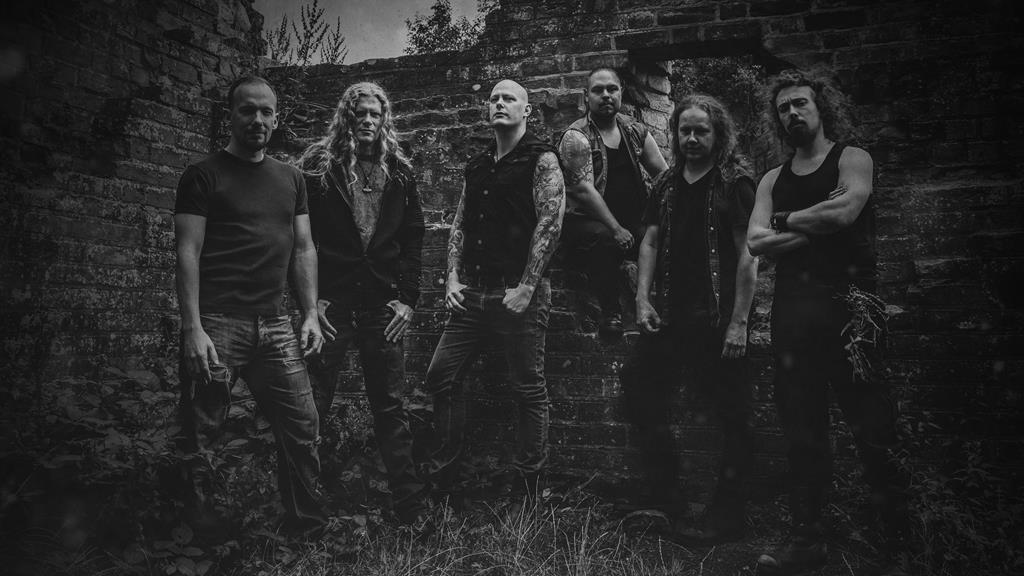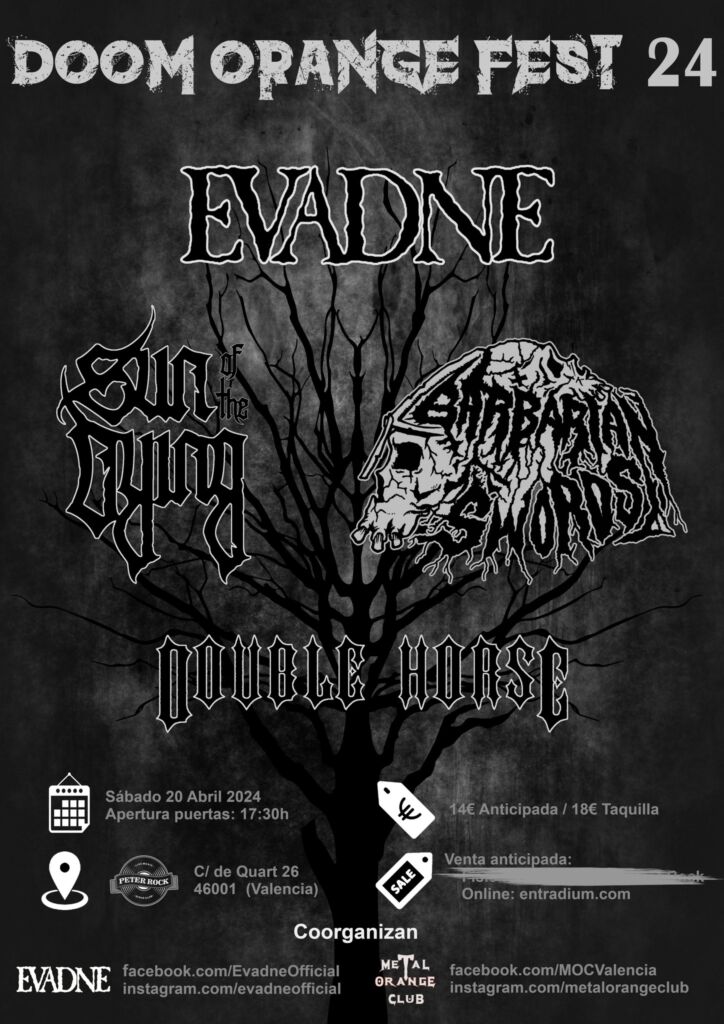VANIR: Entrevista con Martin Holmsgaard Håkan

Entrevistamos a Martin Holmsgaard Håkan, vocalista de la banda danesa VANIR. Se presentan como una banda de Viking/Black metal y hace poco hablábamos de su nuevo single y video "Fejd", que adelantan algo de su nuevo y quinto álbum. Martin nos comenta la línea principal de su trabajo y la importancia del Viking en la escena internacional.
Está claro que vuestra inspiración procede de la mitología nórdica pero, exactamente, ¿qué tipo de fuentes utilizáis para componer las letras? Quiero decir, en España, sabemos de las sagas islandesas pero nada más.
Utilizamos diferentes fuentes como inspiración. Yo (cantante principal) escribo la mayoría de nuestras letras. Parte de la inspiración procede de las Eddas, pero la mayor parte proviene de la lectura de investigación académica y libros de historia. En "Allfather", el proceso de escribir letras ha sido una mezcla de hechos históricos y figuras y referencias culturales conocidas desde el período de 950 a 1014 aproximadamente. En los tiempos de Harold Bluetooth y cuando Tveskæg (Forkbeard) se convirtió en rey. Vanir busca crear un vínculo entre el metal como género musical y la opción de contar una historia sobre nuestros antepasados y la historia de Escandinavia.
Me gustaría preguntarte tu opinión sobre el renacimiento vikingo (origen, causa, significado).
Si se está refiriendo a la comercialización general de los vikingos y la cultura escandinava, es una buena oportunidad para todas las marcas que usan los vikingos como un "tema" para capitalizarlo. El interés por la cultura escandinava es bueno para todas las bandas, el viking metal y la cultura general por igual. Creo que el interés por los vikingos y la mitología nórdica tiene mucho que ver con un aumento generalizado del interés en lo que respecta a la fantasía, las culturas guerreras y la cultura chamánica / tribal.
¿Por qué tomaste el camino ariesgado de un idioma escandinavo, en lugar de combinarlo con un inglés más comprensible y convencional?
Escribimos letras en nuestra lengua nativa porque sentimos que nos acerca a los eventos históricos que escribimos. Pero también hay un grado de aleatoriedad. A veces la idea de una canción comienza en uno u otro idioma. En "Allfather" las canciones más orientadas a la historia están en danés.
Es bastante difícil para mí entender tus letras, obviamente, absolutamente todo está relacionado con el mundo escandinavo antiguo; Tengo la sensación, o más que eso, de que estás hablando de los varegos, las batallas y los dioses, ¿cuál es el resultado final de todo, el significado de todo junto?
Cantamos sobre todos esos temas. La guardia / mercenarios varegos o Vanguard existían aproximadamente entre 900 y 1000 aproximadamente al mismo tiempo que Harald Bluetooth y Svend Bee. Todo el registro es sobre batallas o figuras históricas de ese período.
Hablando de influencias musicales, supongo que formaste parte de la tradición del Black Metal escandinavo, ¿no es así? ¿Alguna influencia más?
Nuestra principal inspiración es una mezcla entre la escena de black metal melódico y la escena de death metal melódico sueco. Bandas como Amon Amath, In Flames, Arch Enemy, Dimmu Borgir o Inmortal.
¿Cuál es el sentido de la canción Fejd, musicalmente hablando, algo alejada del estilo general de "Allfather"? Y sobre el contenido, por casualidad, ¿se centra en el chamanismo?
Fejd, o feudo en inglés, es una palabra del antiguo nórdico para referirse a la lucha. La canción es sobre el levantamiento de Forkbeard contra su padre Harald Bluetooth. Sabemos que la canción tiene un sonido dual para subrayar la lucha entre Barba y Bluetooth. La canción es un llamado a las armas bajo la bandera del cuervo. La canción fue una colaboración con el cantante principal de Iron Fire. Su enfoque es como se mencionó anteriormente, la lucha entre padre e hijo, por lo que tenía sentido tener dos singles en esa canción que representan al viejo Harold y al joven usurpador Forkbeard.
¿Por qué Vanir y no Aesir?
En la fundación de Vanir tuvo más sentido, debido al estilo que jugamos en ese entonces. Sin embargo, creo que Aesir sería más adecuado hoy con un sonido más death / black metal.
Finalmente, ¿quieres enviar un mensaje a los fans españoles y a las personas que están leyendo esta entrevista?
¡Para todos los Einherjers y Valquirias de España! ¡Esperamos que disfrutéis el disco! Y tal vez nos veamos en la carretera ¡SKÅL and SALUTE!¡Y manteneos en el metal!
Muchas gracias por tu tiempo y buena suerte.
Más info:
https://www.facebook.com/vanirdenmark/
http://mightymusic.dk/artists/vanir/
It is clear your inspiration comes from Norse mythology but, exactly, What kind of sources do you use to make up the lyrics? I mean, in Spain, we know about Icelandic Sagas but nothing further.
We use different sources as inspiration. I (lead singer) write most of our lyrics. Some of the inspiration comes from the Edda but most of it comes from reading academic research and history books. On Allfather the process of writing lyrics has been a mix between an interpretation of historical facts and figures and cultural references known from the period of approx. 950 to 1014. At the time of Harold Bluetooth and when Tveskæg (Forkbeard) became king. Vanir seeks to create a link between the Metal as a music genre and the option to tell a story about our ancestors and the history of Scandinavia.
I'd like to ask you about your opinion on Viking revival (origin, cause, meaning).
If you are referring to the mainstream commercialization of Vikings and Scandinavian culture it is a good opportunity for all brands that uses Vikings as a “theme” to capitalize on it. The interest in Scandinavian culture is good for all bands, vikingmetal and mainstream culture alike. I think that the interest in Vikings and Nordic mythology has a lot to do with an all-around increase in interest when it comes to fantasy, warrior cultures and shamanic/tribal culture.
Why did you take the risky way of an Scandinavian language, instead of combine it with more understandable and mainstream English?
We write lyrics in our native tongue because we feel it brings us closer to the historical events of which we write. But there is also a degree of randomness to it. Sometimes the idea to a song starts out in one language or the other. On Allfather the more history-oriented songs are in Danish.
It's pretty difficult for me to understand your lyrics but, obviously, absolutely everything is related with the ancient Scandinavian world; I have the feeling, or more than that, that you are speaking about the Varangians, battles and Gods, which is the final result or the whole meaning of everything together?
We sing about all those topics. The Varangian guard/mercenaries or (Væringjar) existed approx 900 – 1000 so about the same time as Harald blåtand and Svend Tveskæg. The whole record is about battles or historical figures from that period.
Speaking about musical influences, I guess you took part of the Scandinavian Black Metal tradition, isn't it? Any more influences?
Our main inspiration is a mix between the melodic black metal scene and Swedish melodic death metal scene. Bands like Amon Amath, In flames, Arch enemy, Dimmu borgir, Immortal.
What is the sense of the single Fejd, musically speaking, far from the general style of "Allfather"? And about the content, by chance is it focus on shamanism?
Fejd, or feud in English, is and old Nordic word for struggle. The song is about Tveskægs (Forkbeard) uprising against his Father Harald Blåtand. We wished for the song to have a dualistic sound to underline the struggle between Tveskæg and Blåtand. The song is a call to arms under the banner of the raven (Tveskæg).
The song was a collaboration with the Lead singer from Iron Fire. Its focus is as I mentioned before, the struggle between father and son, so it made sense to have two singes on that song representing the old Harold and the young usurper Forkbeard.
Why Vanir and not Aesir?
At the funding of Vanir it made more sense because of the style we played back then. However, I guess Aesir would be more suitable today with or more death/black metal sound.
Finally, Do you want to throw a message to Spanish fans and people who is reading this interview?
For all Einherjers and Valkyries of Spain! We hope that you will enjoy the record! And maybe we will see you on the road! SKÅL and SALUTE! And keep it metal!
Thank very much for your time and good luck.
Otros artículos de VANIR












